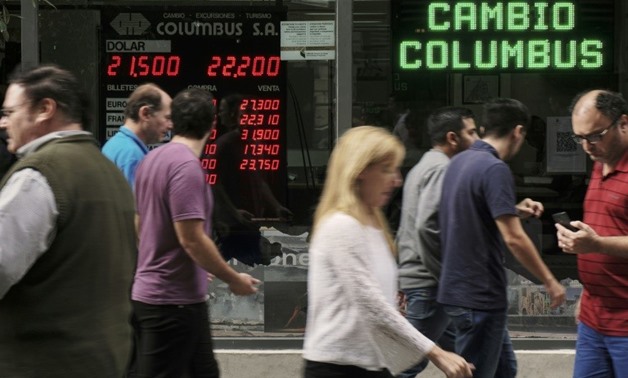
Argentina is turning to the IMF for financing as the peso is buffeted by market turbulence
CAIRO - 9 May 2018: Argentina opened talks with the International Monetary Fund on Tuesday to seek a financial aid package, 17 years after the country defaulted on its debt and 12 years after cutting ties with the fund.
As a bout of market turbulence rocks Latin America's third largest economy, President Mauricio Macri announced that "as a preventative measure, I have decided to begin discussions with the International Monetary Fund for them to grant us a line of credit."
IMF chief Christine Lagarde said talks will begin soon on ways to shore up Argentina's economy.
She welcomed Macri's statement, saying that "discussions have been initiated on how we can work together to strengthen the Argentine economy and these will be pursued in short order."
After the country's currency fell four percent compared to the US dollar, Macri said in a televised speech he had held his first conversation with Lagarde -- but did not say how big a line of credit Argentina is seeking.
"We are pursuing the only path open to us to emerge from stagnation, seeking to avoid a great economic crisis that will set us back and hurt everyone," he said.
Economy Minister Nicolas Dujovne told reporters it was too soon to talk about the details and conditions "but we have agreed that the IMF will offer financial support to Argentina."
But hearkening back to the bitter relations former governments had with the Washington-based lender, Dujovne said "we're talking with an IMF that is very different than the one we knew 20 years ago."
In January 2006, Argentina paid down its last loan to the IMF and severed relations with the fund, refusing even to allow the regular annual review of economic conditions conducted for all member countries for the next 10 years.
The loans at the time were needed after the country suffered an economic crisis in 2001 that sparked the downfall of four presidents and default on $100 billion in foreign debt.
But Argentines objected to the strict conditions imposed by the IMF in exchange for the lending.
- Prevent a crisis -
Macri justified the decision to go to the IMF, saying that while the economy had enjoyed favorable conditions during the first two years of his presidency, conditions have changed.
"We are among the countries of the world that are most dependent on foreign financing, a product of the enormous public spending we inherited and are putting in order," he said.
IMF financing would strengthen his "program of growth and development, giving us greater backing to confront this new global scenario and avoid a crisis like those we have had in our history."
After taking office in December 2015, Macri floated the Argentine peso, ending the strict controls in place under the government of Cristina Kirchner.
But the strengthening of the US dollar in recent days has impacted the peso more than other currencies: it dropped 4.61 percent to 23.41 to the dollar in opening trading Tuesday, and strengthened slightly after Macri's speech at 23.06.
Argentina's Central Bank on Friday raised its key interest rate to 40 percent after the peso plummeted in value earlier in the week.
Although the bank's actions appeared to have stabilized the currency on Monday, the peso fell sharply again on Tuesday, prompting a sell-off on the Buenos Aires Stock Exchange.
The Central Bank is supposed to revisit the benchmark rate once again later in the day.
In addition to the weak peso, Argentines are struggling with double-digit inflation, which hit 24.8 percent last year. The government has set an inflation target of 15 percent, which it insists will not change, but the IMF is forecasting a rate of 19 percent this year.
Macri's government last week lowered its target for the fiscal deficit to 2.7 percent of GDP from 3.2 percent.

Comments
Leave a Comment